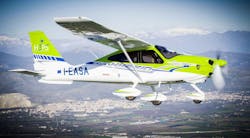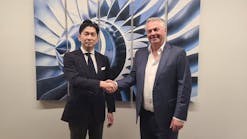Tecnam P2010 H3PS Hybrid Aircraft Takes to the Skies for the First Time – A Milestone in Green Aviation
Tecnam Aircraft, in collaboration with Rolls-Royce and Rotax specialized teams, successfully flew the new P2010 H3PS hybrid aircraft for the first time on Dec. 21, 2021, at precisely 3:54 p.m. CET. The Permit to Fly was issued by ENAC, the Italian Civil Aviation Authority.
The flight was performed by Tecnam's Chief Experimental Test Pilot Lorenzo De Stefano, with Tecnam, Rolls-Royce and Rotax Teams on the ground assisting in this historic moment.
Tecnam P2010 H3PS is powered by a 104kW Rotax 915 IS engine coupled with a 30kW Rolls-Royce electric motor, totaling 134kW (180hp) powertrain in a fully integrated parallel hybrid configuration. As such, this four-seat aircraft is first of its kind.
According to Tecnam Aircraft's R&D Director Fabio Russo, the H3PS successful flight test demonstration marks a major milestone on the aviation industry's journey towards de-carbonization and R&D on alternative powertrains.
"Though H3PS is not intended for market purposes, our successful flight tests demonstrate that hybrid powertrain, with combustion engine coupled with an electric motor, can bear the same useful load of the traditional 180hp combustion engine," said Russo.
H3PS, which stands for "High Power High Scalability Aircraft Hybrid Powertrain," is a project funded under the European Union Horizon 2020 research and innovation program. Launched in 2018, the project has reached its objectives. With H3PS' success, Tecnam Aircraft and project partners have validated the aircraft's scalability potential, lower emissions, state of the art power management technology, building a viable launchpad for future green aircraft models.
Commenting on the future developments, Tecnam's Managing Director Giovanni Pascale Langer stated that the company will continue to focus on driving the green transition in aviation.
"Tecnam's approach to innovation is truly sustainable," said Langer. "Our development focuses on three key pillars: environmentally friendly, technologically viable and marketable solutions. We do this by leveraging our multi-generational expertise, research and development, next-generation technology, and strategic partnerships."
"I look forward to seeing H3PS inspire more innovation and drive our industry forward with cleaner, more efficient technologies," Langer concluded.
Rob Watson, president of Rolls-Royce Electrical added: "The successful first flight of the P2010 H3PS demonstrator is a pioneering achievement by the team to advance hybrid-electric flight. Working with Tecnam and Rotax has been hugely beneficial, and this project has continued to build our capabilities in delivering all-electric and hybrid-electric power and propulsion systems for the advanced air mobility market. Rolls-Royce is committed to investing in the technology solutions to enable and deliver sustainable aviation."
"We are very pleased that we could intensify our collaboration with Tecnam and Rolls-Royce within the H3PS project. The tests showed that there are still challenges to take up, however due to the efforts of all three parties the test flight could be concluded with deeper understanding and of course with a safe landing. The project showed that the joint venture with the qualified knowledge of these three global player companies in aviation lead to very interesting and future-orientated results for innovative propulsion systems", said Michael Dopona, head of design Organization BRP-Rotax.
"In December 2021 ENAC issued the permit to fly, for research and development purposes" - commented the Director General of ENAC, Alessio Quaranta – "to the first Made in Italy General Aviation aircraft powered by hybrid propulsion system (electric - unleaded fuel): the Tecnam P2010 H3PS. It deals with an important technological innovation in favor of savings in consumption and emissions. ENAC actively participated this challenge in developing the new propulsion system and its integration within the Tecnam P2010 airframe, in line with Authority commitment towards a Sustainable Aviation future."


